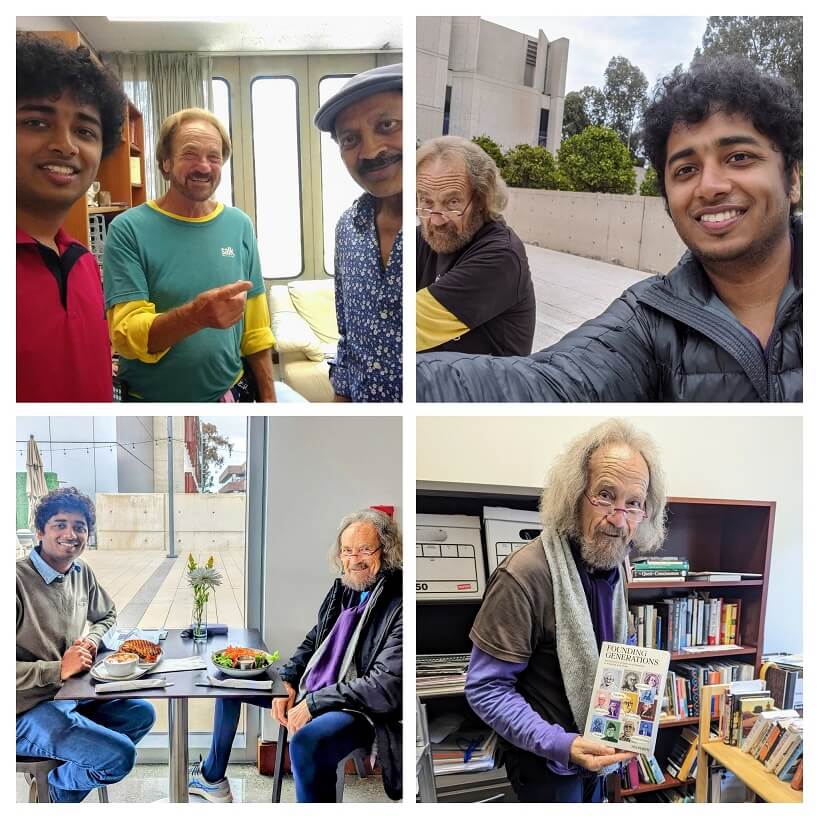The sad passing of a man who possessed the special quality of effortlessly making friends with everyone from teenagers to octagenarians would invoke different emotions and feelings in everyone’s minds. Roger Bingham was a philosopher, speaker, author, science communicator, educator, television host, TV producer, LA Emmy Award Winner, and so much more, but above all, he was a dear friend to everyone who ever conversed with him. I am certain that the Salk Institute, Institute for Neural Computation, and UC San Diego have lost one of their most kind, knowledgeable, and kindred souls who made these institutions all the more stimulating.
Roger and I first met when I arrived at UC San Diego in 2015. For the next couple of years, I would only get glimpses of him, usually walking briskly in the evening (he not only loved Mahatma Gandhi’s ideals but also his habit of walking fast for miles every day as the primary form of physical exercise) or chatting with fellow members in Professor Terry Sejnowski’s lab during the daily tea time. He was always witty, sometimes eccentric, but never deficient in energy, liveliness, and spirit. It was later when I started working on my first book that I got the opportunity to know him from close quarters. Thanks to his warm personality and affectionate nature, the age difference of almost five decades never came between us in forging the bond of friendship. At every step, Roger provided me with his frank criticisms about my thought process regarding the book, introduced me to other scholars who could be helpful in my literary research, and prodded me to think about different perspectives while giving words to my thoughts. He was also very generous to provide a blurb for my book’s cover.
Roger’s work through the Collaboratory and the Science Network are testaments to his creativity, hard work, and passion for science communication. He had the enviable quality to dilute the profound breadth of knowledge that he possessed about everything from filmmaking, philosophy, religion, and history, to physics, neuroscience, linguistics, and psychology in the form of short interesting stories which he distributed without any copyrights. If he had charged a dollar for each story he told, he would have perhaps gathered enough to start another university (which I am sure would have been a highly creative institution).
I last met him in April this year when I visited San Diego before moving back to India. As ever, Roger was full of ideas and the desire to start shooting another directory about the interconnectedness of our world through examples in history. He was very enthusiastic about the thought of visiting India in the future. Dressed in a scarf of his favorite color—purple—he looked as youthful and energetic as ever and as always we went to his favorite spot—Bella Vista Social Club & Caffé—for lunch where everyone always warmly greeted their most colorful patron. I knew in that meeting that perhaps we would not be able to meet for a long time now since I was moving back to India, but I never thought that unfortunately, it would be our last meeting.
My favorite memory of Roger though is from February 2022 when I met him in his office and we were having a lighthearted discussion about British and American accents. Abruptly in between, with hundreds of books on his bookshelves in the background, Roger stood up from his chair and burst into a long speech from Hamlet modulating his voice once every few lines to switch between London, Scottish, and Irish accents. For a few minutes, I forgot that I was sitting in a not-so-spacious office but rather in a grand theatre and witnessing the performance of a great artist and Shakespearean scholar who knew exactly when to portray which emotion on his face while synchronously modulating his voice. Roger, was, after all, a master of many crafts, and the world has lost one of its greatest polymaths.

 Memorability of Political Yatras: Bharat Jodo and Congress's Myopic Strategizing
Memorability of Political Yatras: Bharat Jodo and Congress's Myopic Strategizing